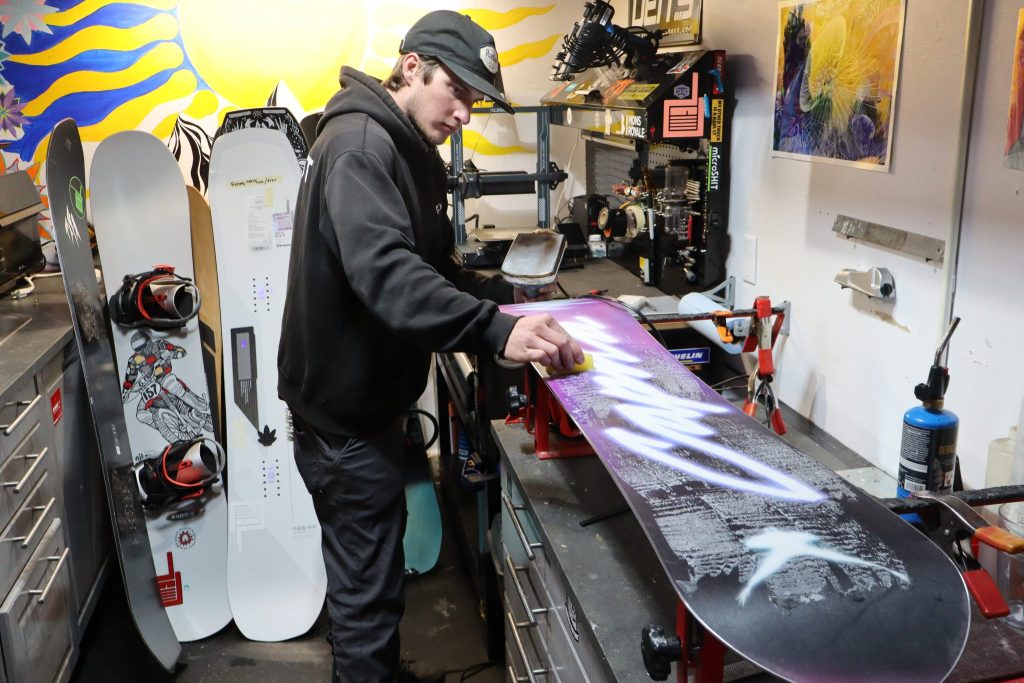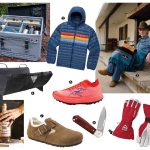Ski and snowboard gear in Colorado getting more expensive as a result of tariffs, according to industry experts
Colorado-based ski companies, like Liberty Skis, source materials from around the world, including countries with high tariff rates

Skyler Stark-Ragsdale/The Aspen Times
Hitting the slopes this ski season? Those planning to participate in winter sports should expect to spend more on gear this season due to tariffs enacted by President Donald Trump’s administration, according to industry experts and Colorado-based outdoor companies.
“You can expect to pay more on Alpine hardgoods, like skis and snowboards, Nordic skis, boots, bindings, apparel, base layers, helmets, goggles,” Snowsports Industries America President Nick Sargent said. “All of that material is either made in Europe … or it’s made in Asia, specifically China.”
Tariffs are taxes that companies pay to the government on goods imported from other countries. Their rates usually equal a percentage of the product’s value. Often, at least part of the cost of tariffs is passed along to customers.
During his second term as president, Trump has enacted a series of tariffs that have affected nearly all goods imported into the country. That includes a “baseline” tariff of 10% on imports from all countries, as well as a 35% tariff on many goods from Canada, 30% on many goods from Mexico and 15% on most goods from the European Union.
China has seen some of the steepest tariffs, with Trump threatening to impose an additional 100% tariff on Chinese imports, before halting that plan amid a trade truce between the two countries. Still, tariff rates for China remain between about 40-60% for many goods, according to Snowsports Industries America.
The tariffs are part of Trump’s “Made in America” agenda. He has said the tariffs will boost American manufacturing, create jobs, boost investment in the United States and reduce the country’s trade deficits with other nations. Critics of tariffs have raised concern about their potential to raise prices and damage the global economy.
Multiple snowsports businesses in Colorado declined to comment on the impacts of tariffs, citing concerns about potential political backlash. But the retailers and manufacturers that did respond said that tariffs have shifted rapidly, making it hard for businesses to plan.
“In my position specifically it has been a point of frustration because we have a lot of this product already on the shelves,” said Charlie Burns, the general manager of Cripple Creek Bike and Backcountry’s Silverthorne location. “A lot of what the tariffs are doing is raising the price for the end user, creating issues for us and our buying team, and that is trickling down to the customer.”
On the manufacturing end, Colorado-based ski companies like Liberty Skis, which is headquartered in Avon, typically source materials from around the world, and are also dealing with the impacts of tariffs.
“It’s a tax that the ski consumers pay. It’s as simple as that,” Liberty Ski Founder Dan Chalfant said of tariffs. “We certainly didn’t want them as a ski industry.”
Winter sports products are mostly manufactured overseas
Snowsports Industries America is a trade association that represents businesses in the winter outdoor industry. Nearly “any winter sports brand you can think of is a member,” Sargent said. The trade association’s board of directors includes representatives of Burton, Salomon, Fischer, Atomic and other snowsports companies.
Since Trump’s first term in office, Snowsports Industries America has had a team scouring the news for details on tariffs “to get concrete, proven information which we can then share with our members,” Sargent said. But when it comes to tariffs, he said the information coming from the Trump administration can change day-to-day, hour-to-hour.
“The one thing we know is there is no rhythm or rhyme to what the Trump administration is doing, and the when, or the where, or the how,” Sargent said. “I’m not trying to be political. I read the news like everyone else, and that’s where we get most of our information.”
The vast majority of winter snowsport products are manufactured outside of the U.S., primarily in European and Asian countries, Sargent said. That means most products are being impacted by tariffs and will likely see price increases.
With tariff rates constantly fluctuating, Sargent said it is difficult to say exactly how much more customers should expect to pay for winter sports gear. In general, he said a 20% increase is the “anecdotal average number” that has been thrown around for what consumers may expect to pay.
While the Trump administration has aimed to bring manufacturing jobs back to the U.S., Sargent said, at least for the winter sports industry, that isn’t really possible.
“That ship sailed like 40 years ago,” he said. “There are manufacturing jobs in the U.S., but there are not manufacturing jobs to the extent where you’re making skis or helmets or bindings or boots. Those are all made in very specific factories around the world.”
Constructing skis is ‘a global sourcing puzzle’
While Liberty Skis designs and tests its skis in the U.S., Chalfant said that the company has always manufactured its skis overseas. This year, in part due to the tariffs, he said Liberty this year shifted its manufacturing from China to Europe.
Regardless of where the skis are made, the materials — including the polyethylene used in the bases and sidewalls, the plastic topsheet and the aluminum alloy that gives skis their strength — come from all over the world, especially Europe.
“It’s always a global sourcing puzzle for skis,” Chalfant said. “If you want to make the very best product, there’s no one area you can source all of the materials from. “
Material costs have gone “way up,” and when Liberty brings its skis to the U.S. to sell them, it is also facing tariffs, Chalfant said. On top of that, he noted that other countries have also imposed reciprocal tariffs on goods coming in from the U.S., so Liberty is also facing increases when it sells its products in other countries, like Australia, France or Germany.
The uncertainty around the Trump administration’s tariffs makes it especially hard to plan for the future because the landscape is constantly changing, Chalfant said. So, it is nearly impossible to project what costs will be down the road.
“With the tariffs constantly shifting that really is the worst part of it because you don’t know if on a whim things will change,” he said. “Every day there are these top-down edicts of ‘We’re going to put greater tariffs on this.’ It makes it impossible to plan.”
While a lot of European ski brands increased prices, Chalfant said Liberty has done its best to limit price increases for its customers by making changes on the manufacturing side.
“It’s the uncertainty that is the biggest factor, although an additional 15% plus is really damaging,” he said. “With skis you’re not dealing with huge margins anyway, so having this increase is really difficult.”
Retailers seeing price increases
At Cripple Creek Bike and Backcountry’s shop in Silverthorne, Burns said prices on winter goods have been changing so quickly due to tariffs that it is sometimes hard for the store’s staff to keep up.
The outdoor retailer, which also has locations in Aspen, Avon, Carbondale and Denver, sells backcountry skis, splitboards, bindings, avalanche equipment and other winter outdoor gear, including gloves and other accessories.
“We don’t have much of anything that is made in the U.S. and even if it is, a lot of manufacturing uses raw materials that are purchased elsewhere,” Burns said. “So we’re seeing price increases regardless. It’s pretty widespread across a variety of products.”
With companies’ costs shifting rapidly and suddenly as a result of tariffs, Burns said retailers are having to adjust their prices. On a weekly basis, he said he is having to go back through the store to re-label products with new tags indicating price increases.
While Burns said he is “never one to pressure sales,” he noted that he has seen prices on winter gear rise a lot over the last few months, and expects that to continue. So, he said, “it might not be a bad call to make that purchase.”
Missing woman found in Pitkin County
After a woman was reported missing Tuesday, Pitkin County Sheriff’s Office has confirmed she has been found.










